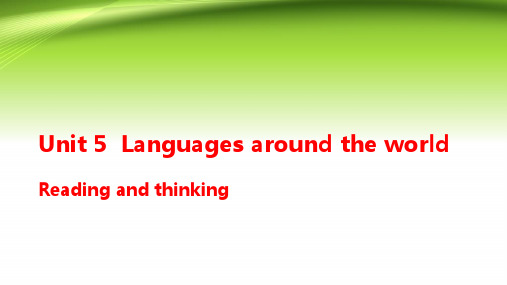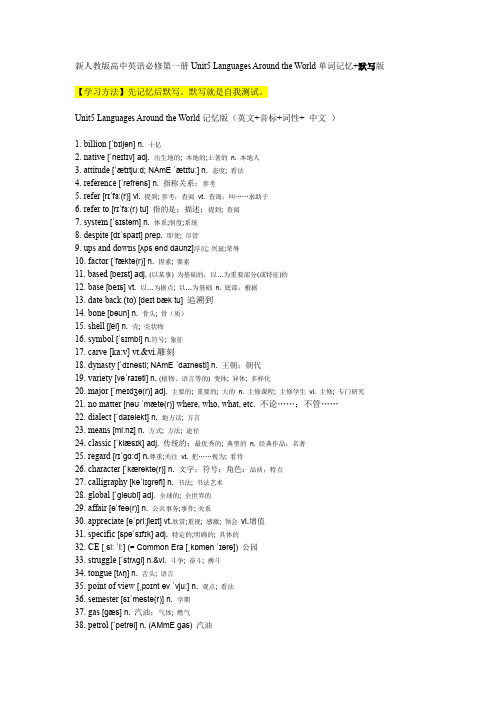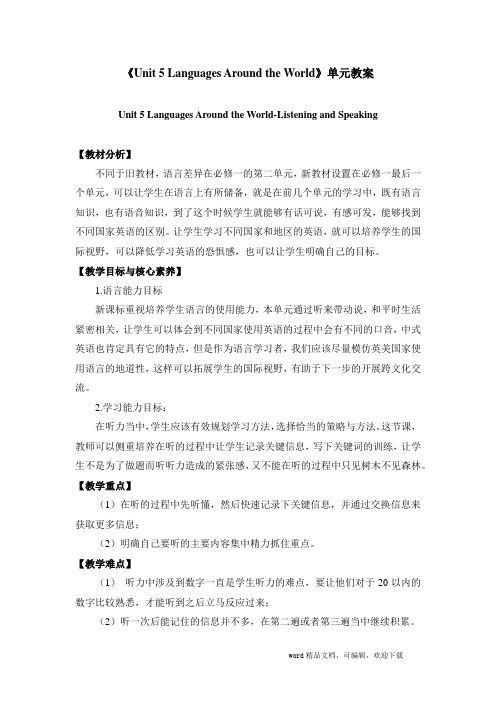2020-2021高一英语必修一Unit 5 Languages around词汇练(原卷版)
2020-2021学年新人教版必修一 Unit 5 Languages around the worldReading and thinking 课件

Reading and thinking
Ⅰ.核心单词 根据音标及词义写出正确的单词
1._b_il_li_o_n___ /'bɪljən/n.十亿 2._n_a_t_iv_e_ /'neɪtɪv/adj.出生地的;本地的;土著的 3._a_t_ti_tu_d_e__ /'ætɪtjuːd/n.态度;看法 4._s_y_s_te_m___ /'sɪstəm/n.体系;制度;系统 5._d_e_s_p_i_te__ /dɪ'spaɪt/prep.即使;尽管 6._f_a_c_to_r___ /'fæktə(r)/n.因素;要素 7. __s_y_m_b_o_l_ /'sɪmbl/n.符号;象征 8. __c_a_rv_e___ /kɑːv/vt.& vi.雕刻
答案:D
2.Please match the main idea of paragraphs.
Paragraphs 1~4: A.China's present is connected with its past
by written Chinese.
Paragraph 5:
B.Many foreigners learn Chinese culture
►第二步|细读——把握教材课文(P62)关键信息 1.What do you think is one of the main factors that has helped the Chinese language and culture survive? A.Chinese writing system B.Chinese wisdom C.Chinese hard work D.Chinese spoken language
2020年新人教版高中英语必修一《Unit 5 Languages Around the World》单元教案(附导学案)2

《Unit 5 Languages Around the World》单元教案Unit 5 Languages Around the World-Listening and Speaking【教材分析】不同于旧教材,语言差异在必修一的第二单元,新教材设置在必修一最后一个单元,可以让学生在语言上有所储备,就是在前几个单元的学习中,既有语言知识,也有语音知识,到了这个时候学生就能够有话可说,有感可发,能够找到不同国家英语的区别。
让学生学习不同国家和地区的英语,就可以培养学生的国际视野,可以降低学习英语的恐惧感,也可以让学生明确自己的目标。
【教学目标与核心素养】1.语言能力目标新课标重视培养学生语言的使用能力,本单元通过听来带动说,和平时生活紧密相关,让学生可以体会到不同国家使用英语的过程中会有不同的口音,中式英语也肯定具有它的特点,但是作为语言学习者,我们应该尽量模仿英美国家使用语言的地道性,这样可以拓展学生的国际视野,有助于下一步的开展跨文化交流。
2.学习能力目标:在听力当中,学生应该有效规划学习方法,选择恰当的策略与方法。
这节课,教师可以侧重培养在听的过程中让学生记录关键信息,写下关键词的训练,让学生不是为了做题而听听力造成的紧张感,又不能在听的过程中只见树木不见森林。
【教学重点】(1)在听的过程中先听懂,然后快速记录下关键信息,并通过交换信息来获取更多信息;(2)明确自己要听的主要内容集中精力抓住重点。
【教学难点】(1)听力中涉及到数字一直是学生听力的难点,要让他们对于20以内的数字比较熟悉,才能听到之后立马反应过来;(2)听一次后能记住的信息并不多,在第二遍或者第三遍当中继续积累。
【教学过程】Unit 5 Languages Around the World-Reading and Thinking【教材分析】本节课是高中英语第一册的最后一个单元的阅读和思考部分,文章难度明显增加,体现在以下几个方面:文章题材是说明文,比较难理解;话题生疏,涉及到历史等知识;生词量增大,而且在语境中理解词汇的要求提高。
人教版高一英语必修一Unit5 language around the world

知识点:
It dates back several thousand years to the use of longgu-:
Date back to …“追溯到”相当于date from…
例如:His family history dates back to the 1700s.
他的家族历史可以追溯到18世纪。
By theShang dynasty (around 1600-1046BCE), these symbols had become a well-developed writing system. Over the years, the system developed into different forms, as it was a time when people were divided geographically, leading to many varieties of dialects and characters. This, however, changed under emperor Qingshihuang of the Qin Dynasty (221-207BCE).
汉子书面语也变成了链接过去和现在的一个重要工具。生活在现在的人可以阅读古代中国人写的经典作品。汉字被发展成为中国文化中非常重要的一种艺术形式------书法,由此可见人民对中国文字系统的高度重视。
Today, the Chinese writing system is still an important part of Chinese culture.As china plays a greater role in global affairs, an increasing number of international students are beginning to appreciate china’s culture and history through this amazing language.
2020_2021学年新教材高中英语Unit5Languagesaroundtheworld教学知识细解码学案新人教版必修第一册

Unit 5 Languages around the world1.refer vi.提到;参考;查阅vt.查询;叫……求助于→reference n.指称关系;参考2.base vt.以……为据点;以……为基础n.底部;根据→based adj.以(某事)为基础的;以……为重要部分(或特征)的3.vary vt.& vi.使多样化;变化→variety n.(植物、语言等的)变体;异体;多样化→various adj.不同的;各种各样的4.globe n.球体;地球仪;地球→global adj.全球的;全世界的5.appreciate vt.欣赏;重视;感激;领会→appreciation n.欣赏;感激;感谢6.equal n.同等的人;相等物adj.相同的;同样的→equally adv.相同地;同样地→equality n.平等7.describe vt.& vi.描述;描写→description n.描写(文字);形容1.character n.文字;符号;角色;品质;特点①Mr.Brown loves to study Chinese characters.文字②Shakespeare made his characters live through their language in his plays.人物③At the last moment,Tom decided to put in a new character to make the story seem more likely.角色④We are good friends and we are much alike in character.性格2.major adj.主要的;重要的;大的n.主修课程;主修学生 vi.主修;专门研究①Li Ming wants to major in physics at college.主修②Environment protection is a major event.重要的③He is a major in French at Stanford.主修学生Words And Phrases知识要点1native adj.出生地的;本地的;土著的n.本地人;本国人(教材P60) How many billion people speak the UN's official languages as their native or second language?有多少亿人把联合国的官方语言作为他们的母语或第二语言?[例1] Native English speakers can understand each other even if they don't speak the same kind of English.以英语作为母语的人,即使他们所讲的语言不尽相同,但也可以相互理解。
2021届高一英语上学期必修一Unit 5 Languages Around the World

必修第一册Unit 5 Languages Around the World能力提升卷姓姓__________ 姓姓__________ 姓姓___________一、完形填空Throughout history, people have been interested in knowing how language first began, but no one knows exactly where or how this happened. 1 , we do know a lot about 2 , the languages of today and also the languages of 3 times. There 4 about three thousand languages in the world today. Chinese is the language 5 the most speakers. English, Russian and Spanish are also spoken by many millions of people. 6 , some languages in the world have less than one hundred speakers.There are several important 7 of languages in the world. For example, most of the languages of 8 are in one large family 9 the Indo-European language family. The original language of this family was spoken about 4,500 years 10 . Many of the present languages of Europe and India are modern 11 of the language of 4,500 years ago.Languages are 12 changing. The English of today is very different 13 the English of 500 years ago. In time some even 14 completely. About 1,000 years ago 15 was a little-known relative of German 16 on one of the borders (边界) of Europe.If a language has 17 speakers or if it is very old, there may be 18 in the way it is spoken in different areas. 19 , the language may have several dialects. Chinese is a good example of dialect differences. Chinese has been spoken for thousands of years by many millions of speakers. The differences among the dialects of Chinese are so great that speakers of Chinese from some parts of China 20 understand speakers from other parts.1. A.But B. So C. However D. Besides2. A.English B. history C. Chinese D. languages3. A.earlier B. later C. modern D. hard4. A.is B. are C. was D. were5. A.for B. with C. in D. of6. A.In a word B. On the one hand C. What’s more D. On the other hand7. A.forms B. systems C. families D. changes8. A.Europe B. Asia C. Africa D. America9. A.called B. spoken C. calling D. speaking10. A.before B. ago C. later D. old11. A.times B. families C. forms D. members12. A.always B. seldom C. often D. sometimes13. A.about B. with C. between D. from14. A.die out B. die away C. die down D. die off15. A.Spanish B. English C. Chinese D. Russian16. A.called B. told C. spoken D. named17. A.a great deal of B. a few C. a little D. a lot of18. A.speakers B. differences C. similarities D. changes19. A.That is B. Therefore C. In fact D. However20. A.mustn’t B. may not C. won’t D. can’t二、阅读理解AWhen we don't understand each other's language, we can talk with the help of signs. A Frenchman was once travelling in England. He could not speak English at all. One day he went into a restaurant and sat down at a table. When the waiter came, he opened his mouth, put his fingers in it, and took out again. He wanted to say. “Bring me something to eat.”The waiter soon brought him a cup of tea. The man moved his head from side to side. The waiter understood him and took the tea away. In a moment he came with a cup of coffee. But the man againrefused it. He shook his head whenever the waiter brought him something to drink, for drinks are not food. When the man was going away, another man came in. This man saw the waiter, and he put his hand on his stomach. That was enough. In a few minutes there was a large plate of meat and vegetables on the table in front of him.So you see, we cannot understand the language of signs as well as we can understand the language of words.21.According to the passage, when people do not understand each other's language, they can talk with the help of ________.A.a waiterB. a teacherC.an EnglishmanD. their hands, heads, and other parts of their bodies22. A Frenchman signed to the waiter ________.A. to give him some medicineB. to bring him a cup of coffeeC. to ask him for foodD. to tell him what he said23. Another man saw the waiter, and put his hand on his stomach. He meant ________.A. he had a stomachacheB. he was hungryC. he was very thirstyD. he was full24. From this story we know ________.A. people can only understand the language of wordsB. proper gestures can help to understand each otherC. waiters should understand body languagesD. it is important to learn foreign languagesBNowadays everybody seems to think that they know English. Many people speak it but few speak it really well. Practice is necessary in speaking English well.Reading is also one of the things that will help you to speak English better. Read whenever you can and whatever you like! Read papers and Internet sites that you like in English every day. Then, you will see that the number of known words is increasing and you are able to speak with more skills. Then you will have made the foundations and a good basis of English. It is not good to stop and get stuck there.Going to England or an Englishspeaking country is a good choice, but many people cannot afford it. If you cannot go, reading and speaking with your friends will also help you to practice your English. However, I think it is very good to visit some Englishspeaking country to see and test your knowledge in everyday life. You will understand the everyday usage of the language in its natural environment. There your level of English is going to improve even faster. Your ability to speak English is better. Nothing can match the excitement and happiness when a native speaker tells you that your English is very good!Finally, in order to speak English well, you must be persistent and do it every day. It is like playing the piano. Pianists play it every day and so should you. Include English in your life and you will see where it is going. Practice, Practice! Read, write and improve your language skills and you are on your way when you will be able to speak it with more and more confidence!25.Which of the following would be the best title for the passage?A.How to Improve Your Language SkillsB.Speaking EnglishC.How to Speak English WellD.Practice, Practice!26.What does the writer suggest about reading?A.Trying to improve your vocabulary.B.Keeping on reading when you have time.C.Stopping when you have a good basis of English.D.Looking up every unknown word when reading.27.The main idea of the last paragraph is that ________.A.we should play the piano every dayB.speaking English is fun and entertainingC.if we've learned to read and write, we'll certainly be able to speakD.we should practice English every day to improve our speaking skills28.According to the passage, what may make the author excited?A.Reading papers and Internet sites.B.Having a good basis of English.C.Going to an Englishspeaking country.D.A native speaker's praise.CI traveled to London, England in the spring of 2016. Actually, I traveled with CAPA International Education on a study program. At that time, I did a full threemonth program but I traveled on weekends and during breaks.I used to live in a small town outside New York. The idea of big cities has always excited me and I wanted to take advantage of that onceinalifetime opportunity. It was a great opportunity for me to see how independent I could be in another country, because I hope to travel a lot more in the future.I lived in a flat in Ealing Broadway with several other students from different American schools. The biggest surprise I found there was the culture shock I experienced. I had expected traveling to London to be an easy transition (转变) for me because I thought their culture was close to that of America. But you know the language and the people were greatly different from what I had expected. They had different accents. In fact, they were noisy and more freethinking than most Americans I knew.However, I tried to take part in their giant Chinese New Year celebration in Trafalgar Square. I went to several Jewish society holiday celebrations and actively participated in any cultural activities I knew at that time. It was great to be able to truly put myself in their culture. These are experiences I couldn't get anywhere else.I would suggest people hoping to follow in my footsteps not let anything hold them back from exploring the foreign cultures presented to them. Yes, you are there for school, but your number one priority (优先) is yourself. So make sure you go home with no regrets. Do not miss anything!29.What was the author's main purpose in going to London?A.To go sightseeing.B.To visit some relatives.C. To join in a study program.D. To experience the life in a big city.30. What did the author think of the opportunity of traveling to London?A. It would change his life.B. It would test his independence.C. It would make his dream come true.D. It would help improve his communication ability.31. What was beyond the author's expectation after arriving in London?A. Culture differences.B. Unfriendly students.C. His living conditions.D. Some strange accents.32. In the last paragraph, the author mainly advises people studying abroad to ________.A. explore more interesting places for travelingB. try to receive more international educationC. combine study with exploring foreign culturesD. look for more ways to deal with the culture shock三、七选五Simple ways to improve your written EnglishMany people think it is really difficult to improve (提高) their writing in English. Don't worry, though. Here are some simple steps that you can take to improve your written English.•Increase your vocabulary.To express yourself clearly, you need a good active vocabulary. That's not just being able to know lots of words — it means actually being able to use them correctly. __33 __Tip: When you learn a new word, try to learn all the forms of that word.•__34 __People often say that we learn to write best by reading. Reading in English is useful in many ways. It is a great way to get an idea of the different styles of writing and see how to use words properly.Tip: __35 __ Learning shouldn't be boring. Read each text several times to make sure you understand how to use new words and expressions in the text.•Improve your grammar.Grammar is very important because it improves the quality (质量) of your writing.Tip: __36 __ The first time, look for general mistakes and the second time look for mistakes with the grammar point you are studying at the moment.•Just do it!The best way to improve your writing is to get a pen and paper and write. Be prepared to write several versions (版本) of each text.__37 __A.Know your readers.B.Read widely and often.C.Always check your writing twice.D.Remember, practice makes perfect!E.Choose books or articles that interest you.e simpler language and shorter sentences to show your ideas.G.Do this by learning new words with example sentences, not just word lists.四、语法填空阅读下面短文,在空白处填入1个适当的单词或括号内单词的正确形式。
Unit 5 Languages around the world(单元解读)-高一英语人教版必修一

同学分享(自
己制作的词汇
库)
1. 能够运用 丰富和恰当的 词汇与句法( 定语从句)写 一篇给外国友 人分享学好中 文的一篇文章 ;2. 高阶思维 :能够通过观 察语言和文化 的发展,客观 分析、辩证思 考事物发展的 因果关系,形 成发散思维。
课时五 课时六
通过观察学生思维导
1. 整合reading中关于英语 学习的困难障碍,并以思维 导图呈现;2. 运用reading 中相关的语言表达句式进行 口头表达,阐述英语学习的 困难,讨论解决的方法;3. 独立完成与主题关联的关于 学习困难的博文初稿并进行 同伴互评,根据同伴陈述的问 题提供自己的方法。
语篇类型
对话 杂志文章
语篇内容
主题意义
介绍世界上的语言和 理解多模态语篇中的
语言学习
画面、图像、声音等
非文字传达的意义
汉字与中华文明传承 回顾汉字书写体系的
的关系
发展历史,阐述其对 中华文明的延续和传
承起到的重要作用。
Discovering Useful Structures
语法
定语从句之关系副词 使学生通过观察,归 纳和总结关系副词来
“关注主题意义,制定 指向核心素养发展的
单元整体教学目标” (教育部,2020)
3
主题意义探究是课堂 教学设计与教学活动 组织的灵魂。探究主 题内容是学生学习的 主要兴趣点与动力来 源,这有助于提高学 生的学习积极性和课 堂参与度(程晓4堂, 2018)
2 Part two
教材分析
版块
Listening and speaking Reading and Thinking
Unit 5 Languages around the world
新人教版高中英语必修第一册Unit5Languages Around the World单词记忆版+默写版(英文,音标,词性,词义)

新人教版高中英语必修第一册Unit5 Languages Around the World单词记忆+默写版【学习方法】先记忆后默写。
默写就是自我测试。
Unit5 Languages Around the World记忆版(英文+音标+词性+ 中文)1. billion [ˈbɪljən] n. 十亿2. native [ˈneɪtɪv] adj. 出生地的; 本地的;土著的n. 本地人3. attitude [ˈætɪtjuːd; NAmE ˈætɪtuː] n. 态度; 看法4. reference [ˈrefrəns] n. 指称关系;参考5. refer [rɪˈfɜː(r)] vi.提到; 参考;查阅vt. 查询;叫……求助于6. refer to [rɪˈfɜː(r) tu]指的是;描述;提到; 查阅7. system [ˈsɪstəm] n. 体系;制度;系统8. despite [dɪˈspaɪt] prep. 即使; 尽管9. ups and downs [ʌps ənd daʊnz]浮沉; 兴衰;荣辱10. factor [ˈfæktə(r)] n. 因素; 要素11. based [beɪst] adj. (以某事) 为基础的;以…为重要部分(或特征)的12. base [beɪs] vt. 以…为据点; 以…为基础n. 底部;根据13. date back (to) [deɪt bæk tu] 追溯到14. bone [bəʊn] n. 骨头; 骨(质)15. shell [ʃel] n. 壳; 壳状物16. symbol [ˈsɪmbl] n.符号; 象征17. carve [ka:v] vt.&vi.雕刻18. dynasty [ˈdɪnəsti; NAmE ˈdaɪnəsti] n. 王朝;朝代19. variety [vəˈraɪəti] n. (植物、语言等的) 变体; 异体; 多样化20. major [ˈmeɪdʒə(r)] adj. 主要的; 重要的; 大的n. 主修课程; 主修学生vi. 主修; 专门研究21. no matter [nəʊˈmætə(r)] where, who, what, etc. 不论……;不管……22. dialect [ˈdaɪəlekt] n. 地方话; 方言23. means[miːnz] n. 方式; 方法; 途径24. classic [ˈklæsɪk] adj. 传统的;最优秀的; 典型的n. 经典作品;名著25. regard [rɪˈɡɑːd] n.尊重;关注vt. 把……视为; 看待26. character [ˈkærəktə(r)] n. 文字;符号;角色;品质;特点27. calligraphy [kəˈlɪɡrəfi] n. 书法; 书法艺术28. global [ˈɡləʊbl] adj. 全球的; 全世界的29. affair [əˈfeə(r)] n. 公共事务;事件; 关系30. appreciate [əˈpriːʃieɪt] vt.欣赏;重视; 感激; 领会vi.增值31. specific [spəˈsɪfɪk] adj. 特定的;明确的; 具体的32. CE [ˌsiː ˈiː] (= Common Era [ˌkɒmən ˈɪərə]) 公园33. struggle [ˈstrʌɡl] n.&vi. 斗争; 奋斗; 搏斗34. tongue [tʌŋ] n. 舌头; 语言35. point of view [ˌpɔɪnt əv ˈvjuː] n. 观点; 看法36. semester [sɪˈmestə(r)] n. 学期37. gas [ɡæs] n. 汽油;气体; 燃气38. petrol [ˈpetrəl] n. (AMmE gas) 汽油39. subway [ˈsʌbweɪ] n. (BrE underground [ˌʌndəˈɡraʊnd]) 地铁40. apartment [əˈpɑːtmənt] n. 公寓套房41. pants [pænts] n. [pl.] (BrE) 内裤; 短裤42. beg [beg] vt. 恳求; 祈求; 哀求43. equal [ˈiːkwəl] n. 同等的人; 相等物adj. 相同的,同样的44. gap [ɡæp] n. 间隔;开口; 差距45. demand [dɪˈmɑːnd] n. 要求; 需求vt. 强烈要求; 需要vi. 查问46. vocabulary [vəˈkæbjələri; vəˈkæbjəleri] n. 词汇47. description [dɪˈskrɪpʃn] n. 描写(文字); 形容48. relate [rɪˈleɪt] vt. 联系; 讲述49. relate to [rɪˈleɪt tu] 与……相关;涉及;谈到新人教版高中英语必修第一册Unit5 Languages Around the World单词默写版【学习方法】先记忆后默写。
2020年新人教版高中英语必修一Unit5LanguagesAroundtheWorld单元教案

《Unit 5 Languages Around the World》单元教案Unit 5 Languages Around the World-Listening and Speaking【教材分析】不同于旧教材,语言差异在必修一的第二单元,新教材设置在必修一最后一个单元,可以让学生在语言上有所储备,就是在前几个单元的学习中,既有语言知识,也有语音知识,到了这个时候学生就能够有话可说,有感可发,能够找到不同国家英语的区别。
让学生学习不同国家和地区的英语,就可以培养学生的国际视野,可以降低学习英语的恐惧感,也可以让学生明确自己的目标。
【教学目标与核心素养】1.语言能力目标新课标重视培养学生语言的使用能力,本单元通过听来带动说,和平时生活紧密相关,让学生可以体会到不同国家使用英语的过程中会有不同的口音,中式英语也肯定具有它的特点,但是作为语言学习者,我们应该尽量模仿英美国家使用语言的地道性,这样可以拓展学生的国际视野,有助于下一步的开展跨文化交流。
2.学习能力目标:在听力当中,学生应该有效规划学习方法,选择恰当的策略与方法。
这节课,教师可以侧重培养在听的过程中让学生记录关键信息,写下关键词的训练,让学生不是为了做题而听听力造成的紧张感,又不能在听的过程中只见树木不见森林。
【教学重点】(1)在听的过程中先听懂,然后快速记录下关键信息,并通过交换信息来获取更多信息;(2)明确自己要听的主要内容集中精力抓住重点。
【教学难点】(1)听力中涉及到数字一直是学生听力的难点,要让他们对于20以内的数字比较熟悉,才能听到之后立马反应过来;(2)听一次后能记住的信息并不多,在第二遍或者第三遍当中继续积累。
【教学过程】Unit 5 Languages Around the World-Reading and Thinking【教材分析】本节课是高中英语第一册的最后一个单元的阅读和思考部分,文章难度明显增加,体现在以下几个方面:文章题材是说明文,比较难理解;话题生疏,涉及到历史等知识;生词量增大,而且在语境中理解词汇的要求提高。
- 1、下载文档前请自行甄别文档内容的完整性,平台不提供额外的编辑、内容补充、找答案等附加服务。
- 2、"仅部分预览"的文档,不可在线预览部分如存在完整性等问题,可反馈申请退款(可完整预览的文档不适用该条件!)。
- 3、如文档侵犯您的权益,请联系客服反馈,我们会尽快为您处理(人工客服工作时间:9:00-18:30)。
Unit5 Languages around the world
一、单词拼写
1.We had to ___________(搏斗) against strong winds all the way.
2.Christina has her own ___________(公寓),with her own car.
3.It’s only five minutes walk to the ___________(地铁) station.
4.Fitness is important in sport,but of at least ___________(同样的) importance are skills. 5.There have been ___________(要求) for the prime minister to resign.
6.The beauty of the waterfall is beyond ___________(形容).
7.You can ___________(讲述) your experience in the discussion.
8.It’s very rude to stick your ___________(舌头) out at people.
9.There is a ___________(间隔) of ten miles between the two villages.
10.There are many ___________(汽油) stations along this road.
11.They should therefore unite to ___________(奋斗) together.
12.I tried speaking to her in her native ___________(语言).
13.I locked myself out of our ___________(公寓) and had to break in.
14.Black people are born ___________(相同的) to the whites so they should share the same rights as them.
15.As populations increase across Australia and the rest of the world,___________(需求) for water will also increase.
16.The sentence provides a vivid (生动的) ___________(描写).
17.He has a poor ___________(词汇),so he can’t express himself correctly.
18.It is difficult to ___________(联系) the cause and effect in the case.
19.Today,the generation ___________(差距) has not disappeared,but it is getting narrow in many families.
20.Air is a mixture of several ___________(气体).
二、选词填空
(1)
have trouble with,struggle for,have...working,be equal to,relate to,
depend on
1.We should help those who are still ___________freedom.
2.It’s cruel of the man to ___________ the horse ___________all day long.
3.His remarks didn’t ___________ the topic under discussion.
4.Please don’t hesitate to turn to us for help whenever you ___________your study.
5.The poor man ___________his son to earn money.
6.Old as he is, he ___________ running a factory.
(2)
date back to,be known for,lead to,point of view,depend on,pay attention to,related to,varieties of
1.From my ___________,Tom was very disappointed at the result.
2.Then look in the text for the words they are ___________.
3.As far as I know, most of the Great Wall ___________ the Ming Dynasty. 4.We should ___________ the culture and customs when visiting a friend.
5.As we all know, all roads ___________ Rome.
6.The West Lake___________ its beautiful scenery.
7.A great many people were not present at the meeting for ___________reasons. 8.My wife and daughter ___________me for their living.
(3)
known for,at the beginning,of great importance,ups and downs,
play a great role in,date back,refer to,according to
1.What does the italicized words___________ in the sentence?
2.China is widely ___________ its ancient civilization.
3.___________,written Chinese was a picture-based language.
4.The traditional handicraft (传统手工艺) can ___________ thousands of years ago. 5.That writing system was___________.
6.China ___________ global affairs.
7.____________ the writer, the Chinese writing system is an important part of Chinese culture. 8.Generally speaking,we will experience ___________before we succeed.。
